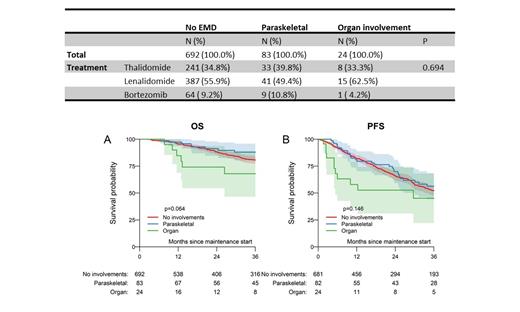Abstract
Patient selection becomes crucial for newly diagnosed multiple myeloma (NDMM), to identify those who may benefit the most from specific treatments. This is particularly important for patients for whom evidence of current treatment options remains very limited. One such subgroup is MM with extramedullary disease (EMD), especially those with organ manifestation. Maintenance therapy after autologous transplantation improves outcome for eligible NDMM patients, but randomized trials only included a small proportion of EMD patients, and to date, no adequate data exist on maintenance in this cohort. Here, we aimed to evaluate the characteristics and outcomes of NDMM with or without EMD after autologous transplant and maintenance therapy.
Cohorts were identified from NDMM patients undergoing first autologous transplant between 2008 and 2018. Involvement had to be documented as absent or present. Maintenance treatment was defined as single-agent treatment within 6 months after first autologous transplant without relapse. Outcomes were calculated from the start of maintenance therapy. Primary end points were progression-free survival (PFS) and overall survival (OS). Secondary end point was cumulative incidence of relapse.
In total, 830 NDMM patients with or without EMD were eligible, receiving either thalidomide (n=287), lenalidomide (n=446), bortezomib (n=75), or daratumumab (n=22; results for these patients will be presented at the meeting). 107 had EMD (n=83 paraskeletal and n=24 organ involvement). Maintenance drug distribution did not differ between NDMM with or without EMD (P=0.69) and is shown in Table 1. Fewer patients with organ involvement had IgA MM (23% vs 21% for no EMD and paraskeletal involvement, respectively). Patients with organ involvement more frequently were ISS stage III (50% vs 24% for no EMD and 15% for paraskeletal involvement).
The median follow-up of the entire cohort was 44 months (95% CI, 40-48 months). According to involvement, 3-year PFS was 52% (48-57%) for patients without EMD, 56% (44-69%) for paraskeletal involvement, and 45% (22-68%) for organ involvement (P=0.15). Of note, early outcome after maintenance start appeared to be significantly worse for organ involvement, with 1-year PFS of 58% vs 81% for paraskeletal involvement and 82% for no EMD. 3-year OS was 81% (77-84%) for no EMD, 88% (80-96%) for paraskeletal involvement, and 68% (47-89%) for organ involvement (p=0.06). Survival curves are depicted in Figure 1. Regarding relapse, organ involvement showed worse early 1-year cumulative incidence, with 42% vs 19% for paraskeletal involvement and 16% for no EMD.
In terms of maintenance therapy in patients without EMD, 3-year PFS was 45% (38-52%) for thalidomide, 59% (52-65%) for lenalidomide, 45% (31-59%) for bortezomib (P=0.005). 3-year OS was 79% (73-85%), 83% (78-88%), and 74% (61-87%; P=0.30). Relapse incidence was also significantly different showing lower relapse rates for lenalidomide (P=0.002).
In terms of maintenance therapy in patients with EMD, 3-year PFS was 52% (36-67%) for thalidomide, 43% (27-60%) for lenalidomide, 65% (32-97%) for bortezomib (P=0.90). Overall survival was 81% (69-93%) for thalidomide, 86% (76-97%) for lenalidomide, and 89% (68-100%) for bortezomib (P=0.70).
In multivariable analysis on PFS (including ISS, performance score, age, remission status) adjusting for early events at 1 year, organ involvement was significantly associated with worse early outcome (hazard ratio, 3.35; P=0.002) and showed no significant difference vs patients with no EMD after 1 year of follow-up. Paraskeletal involvement was not associated with different PFS. Lenalidomide was associated with significantly reduced risk for death or relapse/progression (hazard ratio, 0.69; P=0.003) vs thalidomide, and no difference was seen for bortezomib vs thalidomide. For OS, organ involvement appeared to be associated with worse outcome (hazard ratio 1.71; P=0.17), while no difference was seen for paraskeletal and no EMD. Lenalidomide (hazard ratio 0.72; P=0.05) and bortezomib (hazard ratio, 0.56; P=0.06) appeared to be associated with better OS.
In conclusion, organ involvement was associated with worse early PFS, despite maintenance treatment. Different maintenance treatment did not seem to affect outcome in EMD. For patients without EMD, lenalidomide showed significantly higher PFS compared with thalidomide.
McDonald: BioCryst Pharmaceuticals: Honoraria, Membership on an entity's Board of Directors or advisory committees. Kobbe: Celgene: Research Funding. Anagnostopoulos: Abbvie: Other: clinical trials; Sanofi: Other: clinical trials ; Ocopeptides: Other: clinical trials ; GSK: Other: clinical trials; Incyte: Other: clinical trials ; Takeda: Other: clinical trials ; Amgen: Other: clinical trials ; Janssen: Other: clinical trials; novartis: Other: clinical trials; Celgene: Other: clinical trials; Roche: Other: clinical trials; Astellas: Other: clinical trials . Deconinck: Stemline Therapetutics: Membership on an entity's Board of Directors or advisory committees; Imunogen: Membership on an entity's Board of Directors or advisory committees; Chugai: Research Funding; Novartis: Research Funding; Pfizer: Other: Travel Grants, Research Funding; Abbevie: Research Funding. Delforge: Amgen: Honoraria, Membership on an entity's Board of Directors or advisory committees; Bristol Myers Squibb: Honoraria, Membership on an entity's Board of Directors or advisory committees. Thurner: Takeda: Honoraria; Abbvie: Other: Travel support; Janssen: Other: Travel support; EUSA-Pharma: Honoraria, Other: Travel Support; Astra-Zeneca: Honoraria; Merck: Honoraria. Mielke: Immunicum: Other: Data safety monitoring board; DNA Prime SA: Speakers Bureau; Gilead/KITE: Other: Travel support, Expert panel ; Miltenyi: Other: Data safety monitoring board; Novartis: Speakers Bureau; Celgene/BMS: Speakers Bureau. Beksac: Amgen,Celgene,Janssen,Takeda,Oncopeptides,Sanofi: Consultancy, Speakers Bureau. Schönland: Pfizer: Honoraria; Takeda: Honoraria, Other: Travel grants; Janssen: Honoraria, Other: Travel grants, Research Funding; Prothena: Honoraria, Other: Travel grants; Sanofi: Research Funding. Yakoub-Agha: Jazz Pharmaceuticals: Honoraria.


This feature is available to Subscribers Only
Sign In or Create an Account Close Modal